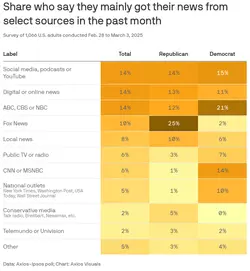Axios-Ipsos poll: COVID's enduring divides
Axios (archive.ph)
By Adriel Bettelheim and Margaret Talev
2025-03-11 09:30:08GMT

Five years after the COVID pandemic began, its legacy is as much political as epidemiological, according to a comprehensive new Axios-Ipsos poll, with Americans' views of what happened cleaved by partisanship and media preferences.
The big picture: 39% say they know someone who died. Everybody wants to leave the era behind. Yet two-thirds of Americans don't believe the nation is adequately prepared to deal with another pandemic or widespread health crisis, according to the Axios-Ipsos American Health Index.

Majorities of Americans still trust the Centers for Disease Control and Prevention (62% overall, 42% Republicans, 86% Democrats) and the National Institutes of Health (57% overall, 40% Republicans, 77% Democrats) — and say the government should keep funding COVID monitoring and prevention measures.
Axios (archive.ph)
By Adriel Bettelheim and Margaret Talev
2025-03-11 09:30:08GMT

Five years after the COVID pandemic began, its legacy is as much political as epidemiological, according to a comprehensive new Axios-Ipsos poll, with Americans' views of what happened cleaved by partisanship and media preferences.
The big picture: 39% say they know someone who died. Everybody wants to leave the era behind. Yet two-thirds of Americans don't believe the nation is adequately prepared to deal with another pandemic or widespread health crisis, according to the Axios-Ipsos American Health Index.
- Trust in public health institutions and leaders divided, declined and never fully recovered.
- Today, just 31% of Americans (67% of Republicans, 7% of Democrats, 22% of independents) say they trust President Trump for information about health topics. Trust in Health and Human Services Secretary Robert F. Kennedy Jr. is equally low.
- Dr. Anthony Fauci, the prominent former director of the National Institute of Allergy and Infectious Diseases who became a political target during the pandemic, today is trusted by nearly three-fourths of Democrats and half of independents but only about 1 in 10 Republicans.
- Since the election, Republicans have driven some uptick of support for federal health agencies and public health measures.
- The difference primarily is in the attitudes of Republicans, Jackson said of societal shifts reflected in the data. These patterns, he said, may seep over into emerging public health challenges, including a resurgence of measles.
- "You can see the seeds of the same phenomenon we saw in 2020 and 2021," Jackson said. "If these institutions get caught in the political crosshairs, their reputations suffer."
- Just 24% of those who identified their primary source of media as a conservative outlet, including Fox News, said the shutdowns were necessary, compared with 81% whose primary source of media was broadcast TV news, and 88% whose primary source was national newspapers, CNN or MSNBC.
- 90% of those who gravitated to conservative media said the shutdowns caused unnecessary economic damage, while only 52% of broadcast watchers and 23% of those who turned to national newspapers, CNN or MSNBC agreed.

Majorities of Americans still trust the Centers for Disease Control and Prevention (62% overall, 42% Republicans, 86% Democrats) and the National Institutes of Health (57% overall, 40% Republicans, 77% Democrats) — and say the government should keep funding COVID monitoring and prevention measures.
- But more than half (53%) believe public health officials lied to the public about how effective vaccines and masks were at preventing the virus' spread, with Republicans far outnumbering Democrats and independents.
- Yet when it comes to their own experience, 7 in 10 said the virus had no lasting impact on their physical or mental health, work/life balance, professional success, ability to pay bills or their family's ability to thrive.
- About one-third said the pandemic experience made them rethink their politics and caused them to get more politically engaged.
- Women, people under 30 and self-described Democrats tended to fare worse in terms of mental health and their finances.
- But for most people, the perception began to shift in the second half of 2022, about a year after the deadly Delta wave, as people began venturing out and returning to their pre-COVID routines.
- Concern about COVID fell about 20 percentage points over 2022 and vaccine uptake began to plummet early in 2023. By the spring of 2023, diners were again packing bars and restaurants, gym memberships were hot again and tours by Taylor Swift and Beyoncé were filling stadiums.
- Now, just 17% of adults report receiving a COVID booster in the last three months, and fewer members of the public see COVID as a threat than the risk of unsafe chemicals or additives in food.
- More than 4 in 10 believe the only people dying from the virus are already sick or unhealthy.
- Trust in the government is down, and most Americans say it doesn't make the health and well-being of the public a priority.
- About a third of the population thinks getting a COVID booster poses a large or moderate risk to their well-being — about the same on the threat scale as air and water pollution.
- And we're divided on whether health care workers should be required to be vaccinated against COVID, with 47% supporting the idea and 42% opposed.
- But more than 7 in 10 oppose ending vaccine requirements for children to attend public schools. And 55% are against preventing the CDC from showing ads encouraging people to get certain vaccines.
- The margin of sampling error is ±3.2 percentage points at the 95% confidence level, for results based on the entire sample of adults.